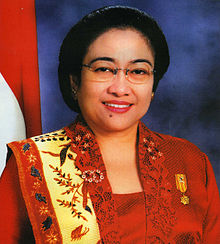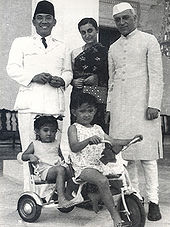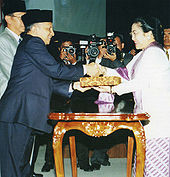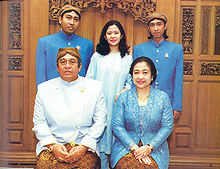- Megawati Sukarnoputri
-
Megawati Sukarnoputri 
President of Indonesia In office
23 July 2001 – 20 October 2004Vice President Hamzah Haz Preceded by Abdurrahman Wahid Succeeded by Susilo Bambang Yudhoyono Vice President of Indonesia In office
26 October 1999 – 23 July 2001President Abdurrahman Wahid Preceded by Bacharuddin Jusuf Habibie Succeeded by Hamzah Haz Personal details Born 23 January 1947
Yogyakarta, IndonesiaPolitical party Democratic Party-Struggle Spouse(s) Surendro Supjarso (d. 1970)
Hassan Gamal Ahmad Hassan (1972)
Taufiq Kiemas (1973–present)Children Mohammad Rizki Pramata
Mohammad Prananda
Puan MaharaniAlma mater Padjadjaran University
University of IndonesiaReligion Islam In this Indonesian name, the name "Sukarnoputri" is a patronymic, not a family name, and the person should be referred to by the given name "Megawati".
Diah Permata Megawati Setiawati Sukarnoputri (
 pronunciation (help·info)[Notes 1] born 23 January 1947), also known simply as Megawati, is an Indonesian politician, and leader of the opposition party PDI-P. She served as the President of Indonesia from 23 July 2001 to 20 October 2004. She was the country's first female President, and the fourth woman to lead a predominantly Muslim nation. She is also the first Indonesian leader to be born after independence. Megawati is the daughter of Indonesia's first president, Sukarno.
pronunciation (help·info)[Notes 1] born 23 January 1947), also known simply as Megawati, is an Indonesian politician, and leader of the opposition party PDI-P. She served as the President of Indonesia from 23 July 2001 to 20 October 2004. She was the country's first female President, and the fourth woman to lead a predominantly Muslim nation. She is also the first Indonesian leader to be born after independence. Megawati is the daughter of Indonesia's first president, Sukarno.After serving as Vice-President under Abdurrahman Wahid, Megawati became President when Wahid was removed from office in 2001. She ran for re-election in the 2004 presidential election but was defeated by Susilo Bambang Yudhoyono. She sought a rematch 2009 presidential election, losing again to Yudhoyono.
Contents
Early life
 President Sukarno, with his children Megawati and Guntur, while receiving Indian Prime Minister Jawaharlal Nehru along with his daughter Indira Gandhi.
President Sukarno, with his children Megawati and Guntur, while receiving Indian Prime Minister Jawaharlal Nehru along with his daughter Indira Gandhi.
Megawati Sukarnoputri was born on 23 January 1947 in Yogyakarta to President Sukarno, who had declared Indonesia's independence from the Netherlands in 1945 and Fatmawati, one of Sukarno's nine wives. Megawati was Sukarno's second child and first daughter. As a child, Megawati grew up in her father's Merdeka Palace. She would dance in front of her father's guests and developed a hobby for gardening.[1] Megawati was 19 when her father was overthrown and succeeded by a military government led by Suharto. Sukarno's family was ignored by the new government provided they stayed out of politics.
Megawati attended Padjadjaran University in Bandung to study agriculture, but dropped out in 1967 to be with her father following his fall from power. In 1970, the year her father died, Megawati went to the University of Indonesia to study psychology but dropped out after two years.[2] She is a practising Muslim but also follows traditional Javanese beliefs.[citation needed]
Political career
Member of the Legislative Branch
In 1986, Suharto gave the status of Proclamation Hero to Sukarno in a ceremony attended by Megawati herself. Suharto's acknowledgment of Sukarno enabled the Indonesian Democratic Party (PDI), a government-sanctioned party, to run a campaign centered on Sukarno nostalgia in the lead up to the 1987 Legislative Elections. Up to that time, Megawati had seen herself as a housewife, but in 1987 she joined PDI and ran for a People's Representative Council (DPR) membership.[1] PDI was only too keen to accept Megawati and boost their own image. Megawati quickly became popular, her status as Sukarno's daughter overruling her general lack of oratorical skills. Although PDI came last in the 1987 Legislative Elections, Megawati was elected to the DPR. Like all members of the DPR she also became a member of the People's Consultative Assembly (MPR).
Chairperson of PDI
Megawati was not re-elected to the DPR or the MPR, but continued as a PDI member. In December 1993, PDI held a National Congress. as was always the case when New Order opposition parties hold their congresses, the Government actively interfered in the Congress to ensure that the opposition parties would be tame towards them. As the Congress approached, three contenders for the Chairpersonship of PDI became evident. The first candidate was incumbent Suryadi who had started to become overly critical of the Government, the second candidate was Budi Harjono a Government-friendly figure whom the Government wanted to win the Chairpersonship, and finally, there was Megawati. Megawati's candidacy received such overwhelming support that her election at the Congress would only be a formality.[3]
Sensing this, the Government began to maneuver to ensure that Megawati would not be elected. When the Congress assembled, the Government began to stall and all attempts to hold the Chairperson election were delayed.[3] A situation then developed whereby if PDI did not elect a Chairperson by the end of the Congress, the Congress would not be allowed to continue because their permit to assemble would run out. As the hours ticked down to the end of the Congress, troops began gathering at the site of the Congress. Finally with two hours before the permit to assemble ran out, Megawati called a press conference. Megawati stated at the press conference, that because she enjoyed the support of a majority of PDI members, she was now the de facto Chairperson of PDI.[3] Despite her relative lack of political experience, she was popular in part for her status as the daughter of Sukarno, but also because she was seen as free of corruption and having admirable personal qualities. Under her leadership, PDI gained a large following among the urban poor and both urban and rural middle classes.
On the other hand the Government was outraged that they failed to prevent Megawati's election as Chairperson of PDI. They never acknowledged Megawati although Megawati's self-appointment to the Chairpersonship had been ratified in 1994 by PDI. Finally in 1996, the Government managed to convene a Special National Congress in Medan. This Congress, attended by anti-Megawati figures, re-elected Suryadi to the Chairpersonship of PDI. Megawati and her camp refused to acknowledge the results of the Government-backed congress, and PDI was divided into pro-Megawati and anti-Megawati camps.
Suryadi began threatening to take back PDI's Headquarters in Jakarta. This threat came true during the morning of 27 July 1996.[4] Suryadi's supporters (reportedly with the Government's backing) attacked the PDI Headquarters and faced resistance from Megawati supporters who had been stationed there ever since the National Congress in Medan. In the ensuing fight, Megawati's supporters managed to hold on to the headquarters. A riot then ensued, followed by a crackdown by the Government. The Government later blamed the riots on the People's Democracy Party (PRD); they recognized Suryadi's PDI as the official PDI and also banned Megawati from competing in the 1997 Legislative Election.
Despite what seemed to be a political defeat, Megawati scored a moral victory and her popularity grew. When the time came for the 1997 Legislative Elections, Megawati and her supporters threw their support behind the United Development Party (PPP), the other political party that the Government had allowed to exist.
Reformasi
In mid 1997, Indonesia began to be affected by the Asian Financial Crisis and showed severe economic distress by late January 1998 when the rupiah fell to nearly 15,000 against the dollar, compared to only 4,000 in early December. This combined with increasing public anger at pervasive corruption, culminated in May 1998 with Suharto's resignation from the Presidency and the assumption of that office by Vice President B. J. Habibie. With removal of the restrictions on her, Megawati began to consolidate her political position. In October 1998, her supporters held a National Congress whereby Megawati's PDI would now be known as the Indonesian Democratic Party-Struggle (PDI-P) to differentiate itself from the PDI of Suryadi. Megawati was elected as Chairperson and was nominated as the Party's Presidential candidate.[5]
Megawati's PDI-P, together with Abdurrahman Wahid's National Awakening Party (PKB) and Amien Rais' National Mandate Party (PAN), became the leading forces of the Reform movement. Despite their popularity, Megawati, Wahid, and Rais adopted a moderate stance, preferring to wait until the 1999 Legislative Elections to begin taking power.[6] In November 1998, Megawati, together with Wahid, Rais, and Hamengkubuwono X reiterated their commitment to Reform through the Ciganjur Statement.
As the 1999 legislative elections approached, there was hope that Megawati, Wahid, and Amien would form a political coalition against President Habibie and Golkar. In May 1999, this hope came close to being a reality when Alwi Shihab held a press conference at his house during which Megawati, Wahid, and Amien were to announce that they would work together. At the last minute, Megawati chose not to attend because she decided that she could not trust Amien.[7] In June 1999, the 1999 legislative elections were held. PDI-P was undoubtedly the most popular political party and it came first with 33% of the votes.
With PDI-P's Legislative Election victory, the prospects of Megawati becoming President became more real. This prospect was detested by the United Development Party (PPP) who did not want Indonesia to have a female President.[8] In preparation for the 1999 MPR General Session, PDI-P formed a loose coalition with PKB. As the MPR General Session approached, it seemed as if the Presidential election was going to be contested by Megawati and Habibie but by late June, Amien had managed to draw the Islamic parties together in a coalition called the Central Axis.[7] The Presidential election also became a three way race when Amien floated the idea of nominating Wahid for President; but Wahid did not provide a clear response to this.
1999 MPR General Session
Megawati's PDI-P and PKB coalition faced its first test when the MPR assembled to choose its Chairman. Megawati threw her support behind Matori Abdul Djalil, the Chairman of PKB. Matori was overwhelmingly defeated by Amien, who in addition to enjoying Central Axis support was also backed by Golkar.[8] The Golkar and Central Axis coalition then struck again when they secured Akbar Tanjung's election as Head of DPR. At this stage, people became wary that Megawati, who best represented reform, was going to be obstructed by the political process and that the status quo was going to be preserved. PDI-P supporters began to gather in Jakarta.
With the rejection of Habibie's accountability speech and Habibie's withdrawal from the Presidential race, the Presidential election to be held on 20 October 1999 came down to Megawati and Wahid. Megawati took an early lead, but was overtaken and lost with 313 votes compared to Wahid's 373. Megawati's loss provoked her supporters to begin rioting.[8] Riots raged in Java and Bali. In the City of Solo, PDI-P masses managed to attack Amien's house.
The next day, the MPR assembled to elect the Vice President. PDI-P had considered nominating Megawati for Vice President, but were concerned that the Central Axis and Golkar coalition would once again thwart her. Finally, PKB took the initiative and nominated Megawati as a Vice Presidential candidate. She faced stiff competition from Hamzah Haz, Akbar Tanjung, and General Wiranto.[8] Well aware of the riots that had happened after Megawati's Presidential election defeat, Akbar and Wiranto withdrew from the Vice Presidential race. Hamzah on the other hand insisted on competing with Megawati. Finally, Megawati defeated Hamzah with 396 votes to 284 to become Vice President. In her inauguration speech, she called for her supporters to calm down.
Vice Presidency
Work as Vice President
As Vice President, Megawati had considerable authority by virtue of her commanding a lot of the seats in the DPR. Wahid delegated to her the problems in Ambon, although she was not successful.[9] By the time the MPR Annual Session assembled in August 2000, many considered Wahid to be ineffective as President or at the very least as an administrator. Wahid responded to this by issuing a Presidential Decree, giving Megawati day-to-day control of the Government.[9]
2000 PDI-P National Congress
The First PDI-P Congress was held in Semarang, Central Java in April 2000, at which Megawati was re-elected as the Chairperson of PDI-P for a 2nd term.
The Congress was noted as one where Megawati consolidated her position within PDI-P by taking harsh measures to remove potential rivals.[10] During the election for the Chairperson, two other candidates emerged in the form of Eros Djarot and Dimyati Hartono. Both Eros and Dimyati ran for the Chairpersonship because they did not want Megawati to hold the PDI-P Chairpersonship while concurrently being Vice President. When Eros finally received his nomination from the South Jakarta branch, membership problems arose and made his nomination void. Eros was then not allowed to go and participate in the congress. Disillusioned with what he perceived to be a cult of personality developing around Megawati, Eros left PDI-P. In July 2002, he formed the Freedom Bull National Party. Although Dimyati's candidacy was not opposed as harshly as Eros, he was removed from his position as Head of PDI-P's Central Branch. He kept his position as a People's Representative Council (DPR) member but retired in February 2002. In April 2002, Dimyati formed the Our Homeland of Indonesia Party (PITA).
Relationship with Wahid and rise to the Presidency
Megawati had an ambivalent relationship with Wahid. During the Cabinet reshuffle of August 2000 for example, Megawati was not present for the announcement of the new Cabinet line-up.[11] At another occasion, when the political tide began to rise up against Wahid, Megawati defended her President and lashed out against critics of the Government.[12] In 2001, Megawati began to distance herself from Wahid as a Special Session of the MPR approached and the prospects of her becoming President began to get better. Although she refused to make any specific comments, she showed signs of preparing herself to be President, such as holding a meeting with party leaders a day before the Special Session was due to start.[13]
Presidency
On July 23, 2001, the People's Consultative Assembly assembled. Its members unanimously removed Wahid from office before appointing Megawati as President. She thus became the fourth woman to lead a Muslim nation (after Benazir Bhutto of Pakistan and Khaleda Zia and Hasina Wajed of Bangladesh).
She ran for re-election in the 2004 presidential election, but was defeated by Susilo Bambang Yudhoyono in the second round, held on 20 September 2004. She famously refused to congratulate the new president in public.
Post-Presidency
On 11 September 2007 Megawati announced her 2009 reelection bid at a gathering of the PDI-P (Indonesian Democratic Party of Struggle). Soetardjo Soerjoguritno confirmed her willingness to be nominated as her party's presidential candidate.[14] However, she failed to win this election to the incumbent President Yudhoyono.
Family
Megawati's first husband, First Lieutenant Surendro Supjarso, was killed in a plane crash in Irian Jaya in 1970. In 1972, she married Hassan Gamal Ahmad Hassan, an Egyptian diplomat. The marriage was annulled shortly after.[2] She married Taufiq Kiemas, her present husband, in 1973.[15] They have three children, Mohammad Rizki Pramata, Mohammad Prananda and Puan Maharani, now in their 30s.
Etymology of "Megawati Sukarnoputri"
Sukarnoputri means "daughter of Sukarno" and it is not a family name: Javanese often do not have family names. She is simply referred to as 'Megawati' (or 'Mega') which is derived from Sanskrit meghavatī = "she who has a cloud", i.e. a raincloud, as it was raining when she was born. Biju Patnaik, an eminent Indian leader named her on the request of Sukarno.[16]
Notes
- ^ In traditional Indonesian spelling, her name is written as Dyah Permata Megawati Setyawati Soekarnoputri.
References
- East, Roger; Thomas, Richard (2003-08-05). Profiles of People in Power: the World's Government Leaders. Routledge. pp. 232–234. ISBN 185743126X. http://books.google.com/?id=Mz-fXRsedPMC.
- ^ a b Megawati Soekarnoputri, Mbak Pendiam itu Emas | Biografi Tokoh Indonesia[dead link]
- ^ a b East & Thomas 2003, p. 233
- ^ a b c Megawati Soekarnoputri, Pemimpin Berkepribadian Kuat | Biografi Tokoh Indonesia[dead link]
- ^ B., Edy (10 August 1996). "Kronologi Peristiwa 27 Juli 1996". Tempo. Archived from the original on 2007-09-27. http://web.archive.org/web/20070927200959/http://www.tempointeraktif.com/ang/min/01/23/utama1.htm. Retrieved 2006-10-31.
- ^ "KOMPAS-11: PARTAI DEMOKRASI INDONESIA PERJUANGAN (PDI PERJUANGAN)". Seasite.niu.edu. http://www.seasite.niu.edu/Indonesian/Indonesian_Elections/Indo-pemilu99/11pdip.htm. Retrieved 2011-11-05.
- ^ Barton, Greg (2002). Abdurrahman Wahid: Muslim Democrat, Indonesian President. Singapore: UNSW Press. p. 255. ISBN 0-86840-405-5.
- ^ a b Barton, Greg (2002). Abdurrahman Wahid: Muslim Democrat, Indonesian President. Singapore: UNSW Press. p. 270. ISBN 0-86840-405-5.
- ^ a b c d http://www.nbr.org/publications/briefing/pdf/brief9.pdf
- ^ a b "Fighting in the Malukus heightens tensions across Indonesia and within the Wahid cabinet". Wsws.org. http://www.wsws.org/articles/2000/jan2000/ind-j10.shtml. Retrieved 2011-11-05.
- ^ Firmansyah, Arif (11 February 2005). "Kisah Para Penantang Yang Terpental (The Story of the Ousted Challengers)". Tempo. http://www.tempointeraktif.com/hg/narasi/2005/02/11/nrs,20050211-03,id.html. Retrieved 2006-11-02.
- ^ Barton, Greg (2002). Abdurrahman Wahid: Muslim Democrat, Indonesian President. Singapore: UNSW Press. p. 327. ISBN 0-86840-405-5.
- ^ Barton, Greg (2002). Abdurrahman Wahid: Muslim Democrat, Indonesian President. Singapore: UNSW Press. p. 342. ISBN 0-86840-405-5.
- ^ [INDONESIA-NEWS] JKTP - Megawati to Host Meeting wit[dead link]
- ^ "Indonesia's Megawati in presidential comeback bid", AFX News Limited (Forbes.com), September 11, 2007.
- ^ Guerin, Bill (17 August 2002). "Indonesia's First Man". Asia Times Online. http://www.atimes.com/atimes/Southeast_Asia/DH17Ae01.html. Retrieved 23 June 2009.
- ^ Speech by Indian President R K Narayanan in honor of Megawati Sukarnoputri[dead link]
External links
- Forbes - Megawati is ranked eighth on The World's Top Ten Most Powerful Women 2004
- TIME Magazine - The Princess Who Settled for the Presidency
- Biography of Megawati Soekarnoputri at SekolahVirtual
Political offices Preceded by
Bacharuddin Jusuf HabibieVice President of Indonesia
1999–2001Succeeded by
Hamzah HazPreceded by
Abdurrahman WahidPresident of Indonesia
2001–2004Succeeded by
Susilo Bambang YudhoyonoPresidents of Indonesia 
Sukarno · Suharto · Bacharuddin Jusuf Habibie · Abdurrahman Wahid · Megawati Sukarnoputri · Susilo Bambang Yudhoyono

Vice Presidents of Indonesia Mohammad Hatta · Hamengkubuwono IX · Adam Malik · Umar Wirahadikusumah · Sudharmono · Try Sutrisno · Bacharuddin Jusuf Habibie · Megawati Sukarnoputri · Hamzah Haz · Jusuf Kalla · Boediono
 Categories:
Categories:- 1947 births
- Balinese people
- Female heads of government
- Female heads of state
- Indonesian 2009 presidential candidates
- Indonesian Muslims
- Javanese people
- Living people
- People from Yogyakarta
- Presidents of Indonesia
- Sukarno
- Vice Presidents of Indonesia
- Indonesian Democratic Party – Struggle politicians
Wikimedia Foundation. 2010.


